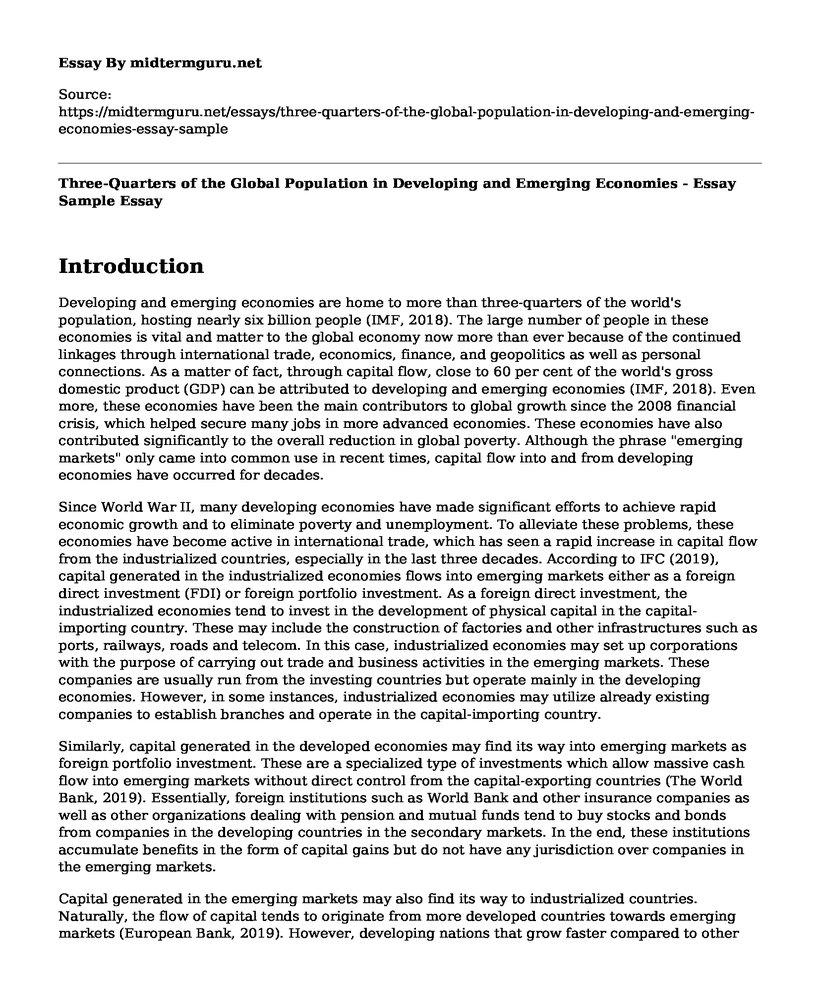Introduction
Developing and emerging economies are home to more than three-quarters of the world's population, hosting nearly six billion people (IMF, 2018). The large number of people in these economies is vital and matter to the global economy now more than ever because of the continued linkages through international trade, economics, finance, and geopolitics as well as personal connections. As a matter of fact, through capital flow, close to 60 per cent of the world's gross domestic product (GDP) can be attributed to developing and emerging economies (IMF, 2018). Even more, these economies have been the main contributors to global growth since the 2008 financial crisis, which helped secure many jobs in more advanced economies. These economies have also contributed significantly to the overall reduction in global poverty. Although the phrase "emerging markets" only came into common use in recent times, capital flow into and from developing economies have occurred for decades.
Since World War II, many developing economies have made significant efforts to achieve rapid economic growth and to eliminate poverty and unemployment. To alleviate these problems, these economies have become active in international trade, which has seen a rapid increase in capital flow from the industrialized countries, especially in the last three decades. According to IFC (2019), capital generated in the industrialized economies flows into emerging markets either as a foreign direct investment (FDI) or foreign portfolio investment. As a foreign direct investment, the industrialized economies tend to invest in the development of physical capital in the capital-importing country. These may include the construction of factories and other infrastructures such as ports, railways, roads and telecom. In this case, industrialized economies may set up corporations with the purpose of carrying out trade and business activities in the emerging markets. These companies are usually run from the investing countries but operate mainly in the developing economies. However, in some instances, industrialized economies may utilize already existing companies to establish branches and operate in the capital-importing country.
Similarly, capital generated in the developed economies may find its way into emerging markets as foreign portfolio investment. These are a specialized type of investments which allow massive cash flow into emerging markets without direct control from the capital-exporting countries (The World Bank, 2019). Essentially, foreign institutions such as World Bank and other insurance companies as well as other organizations dealing with pension and mutual funds tend to buy stocks and bonds from companies in the developing countries in the secondary markets. In the end, these institutions accumulate benefits in the form of capital gains but do not have any jurisdiction over companies in the emerging markets.
Capital generated in the emerging markets may also find its way to industrialized countries. Naturally, the flow of capital tends to originate from more developed countries towards emerging markets (European Bank, 2019). However, developing nations that grow faster compared to other countries in the same category tend to attract more foreign direct investments. In the long run, their foreign reserves accumulate to the extent that they become net capital exporters.
According to (OECD, 2019), markets are considered to be less developed if they have infrastructures which are generally underdeveloped, generate income below average, and have relatively inferior human development index. Emerging markets, on the other hand, are economies which have growth averages, which are slightly above the normal global average and an overall GDP per capita income, which is low compared to various industrialized countries.
Conclusion
In conclusion, capital generated in the developed markets often finds its way to and from emerging markets. It always flows in two ways; either as a foreign direct investment which involves investing in physical structures or foreign portfolio investment through the selling and buying of stocks and bonds. Markets are less developed if they have poor infrastructure and often generate income below the global average while emerging markets have growth average and infrastructure, which is slightly above the global average.
References
European Bank. (2019). 2018 joint report on multilateral development banks' climate finance infographic. Retrieved from https://www.ebrd.com/documents/climate-finance/2018-joint-report-on-multilateral-development-banks-climate-finance-infographic.pdf?blobnocache=true
IFC. (2019). Lessons of experience no. 5: Foreign direct investment. Retrieved from https://www.ifc.org/wps/wcm/connect/publications_ext_content/ifc_external_publication_site/by+title/lessonsofexperienceno5
IMF. (2019). IMF data: Access to macroeconomics and financial data. Retrieved from https://data.imf.org/?sk=388DFA60-1D26-4ADE-B505-A05A558D9A42
OECD. (2019). Globalization and emerging markets. Retrieved from https://www.google.com/url?client=internal-uds-cse&cx=012432601748511391518:xzeadub0b0a&q=http://www.oecd.org/regional/searf2009/42576801.pdf&sa=U&ved=2ahUKEwjT8crtj6jkAhVFXBoKHagyBukQFjAAegQIBBAB&usg=AOvVaw2fJRxHUQzsptuPR4i53ytP
The World Bank. (2019). The hidden costs of index investing in foreign markets. Retrieved from https://www.worldbank.org/en/search?q=foreign+portfolio+investments¤tTab=1
Cite this page
Three-Quarters of the Global Population in Developing and Emerging Economies - Essay Sample. (2023, Feb 09). Retrieved from https://midtermguru.com/essays/three-quarters-of-the-global-population-in-developing-and-emerging-economies-essay-sample
If you are the original author of this essay and no longer wish to have it published on the midtermguru.com website, please click below to request its removal:
- Essay Sample on Realism vs Liberalism
- Does Any Country Have the Right to Invade Others and Control Them
- Critical Analysis of the Static Budget - Report Paper Example
- Marginal Cost Role in the Economy - Paper Example
- The War in the Philippines: Sustaining American Politics Amidst Imperialism - Essay Sample
- Building Positive Relationships Through State Coercion - Essay Sample
- Chile: The Highest Ranked Economy in Latin America - Essay Sample







